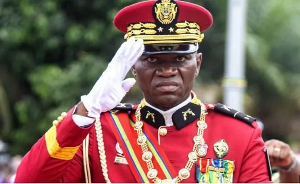Ghana Integrity Initiative (GII), the local chapter of the world anti-corruption body, Transparency International (TI) has expressed disappointment at President John Kufuor’s deafening silence on the issue of corruption in his 2007 sessional address, delivered to Parliament yesterday.
Speaking to The Chronicle minutes after the President’s address, the Acting Executive Secretary of GII, Ms. Linda Ofori-Kwafo, said for a government that had declared ‘zero-tolerance for corruption,’ “We were very disappointed that the President left out this very important part of a national agenda from his address,” adding “ He should have told us what progress we have made.”
According to Ms. Ofori-Kwafo, following research findings by the Centre for Democratic development (CDD), African Peer Review Mechanism (APRM) and TI’s Corruption Perception Index (CPI), that there is increasing corruption in Ghana, corruption should still be high on the national agenda.
The anti-corruption body’s boss pointed out that the fight against corruption is a continued thing and anytime there seem to be a relaxation in the fight, those who engage in it act with impunity, thereby affecting whatever efforts are in place.
Ms. Ofori-Kwafo submitted that all the sectors that the president spoke about government embarking on certain developments are never free from corruption.
“Has government achieved zero-tolerance, that is why the president was silent on corruption or Government is accepting that it has lost the fight against corruption,” Ms. Ofori-Kwafo quizzed.
President Kufuor, yesterday delivered his State of the Nation Address to a Parliament, mainly composed of members of his New Patriotic Party (NPP), following the boycott of Parliamentary proceedings by Members of Parliament (MPs) belonging to the leading minority National Democratic Congress (NDC) party.
The NDC MPs announced their boycott on Tuesday in solidarity with their jailed colleague MP for Keta, Mr. Dan Abodakpi.
The President’s deafening silence on corruption, a canker on which he had declared ‘zero-tolerance’, on his assumption of office was quite significant and has attracted reactions from various quarters.
Even though the President asserted that “continued good governance is a top priority policy which has underpinned all activities” of his government for the last six years, he did not zero in on the issue of corruption which has been a topical national issue over the years.
The president highlighted issues of citizens’ participation in governance at all levels as well as implementing policies and programmes to enable them realise their full potential, emphasizing on the need for assemblies to appreciate the quantum of funding made available to them in order to prioritise their needs, and rationalize their spending.
He mentioned also investments that Government had made into the training and equipping of the police, “to enhance the quality of policing and the law and order situation in the country,” disclosing that “In 2006 alone, 3, 547 new police personnel were recruited into the service.”
This, he said had reflected in the improving law and order situation in the country.” The President appealed to traditional authorities to be mindful of the need for peace as the bedrock of our development and “shun all matters that will degenerate into conflicts and instability in their respective areas.
Ghana’s performance on the corruption perception index (CPI) for last year was at par with the least scores of 3.3 out of a 10-point maximum score chalked in 1999 and 2003.
Ghana scored 3.5 and 3.4 in 2000 and 2001 respectively, with the highest score of 3.9 being chalked in 2002.
The year 2003 however saw a drop in our scoring to 3.3 whilst 2004 saw an improved performance with a score of 3.6. The last two years, 2005 and 2006 saw Ghana’s performance declining with scores of 3.5 and 3.3 respectively.
General News of Friday, 9 February 2007
Source: Chronicle
















